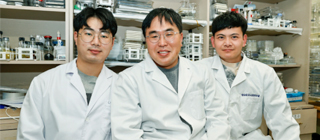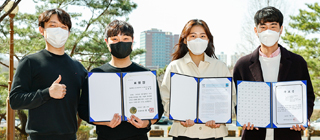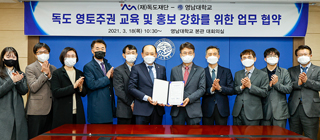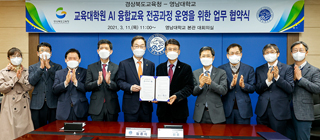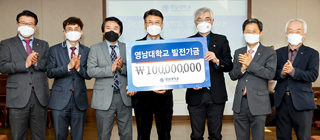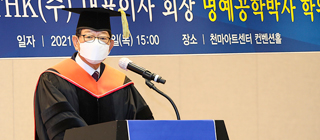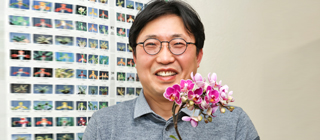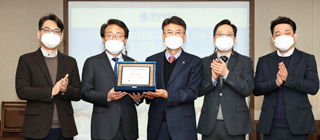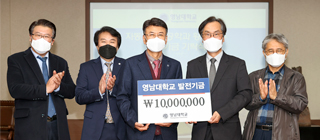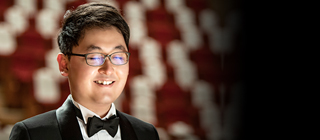-
Developed fluorine organic/inorganic nano-hybrid materials that are flexible and printable Supplements weakness of existing materials making it possible to procure key organic/inorganic characteristics Published in recent issue of global academic journal in the materials science sector [March 29, 2021] <School of Chemical Engineering Professor Kim Se-hyeon’s Research Team (major in polymer and bio materials)> (Left to right: Ye Heqing, Professor Kim Se-hyeon, Wang Rixuan) YU School of Chemical Engineering Professor Kim Se-hyeon’s (42) research team (major in polymer and bio materials) developed new material technologies that can be used for next-generation flexible display. Professor Kim’s research team including Ye Heqing (22, sixth term in integrated master’s and doctorate’s program) and Wang Rixuan (30, 2nd term in doctorate’s program) of the Graduate School of Chemical Engineering developed a fluorine organic/inorganic nano-hybrid materials technologies that can be applied in thin-film transistors (TFTs) for next-generation flexible/print electronic materials through joint-research with Professor Kim Joo-young’s research team at Kangwon National University. Professor Kim said, “We developed a new flexible/print material that can be applied to the insulation layer in TFTs, which are unit materials of switching and memory of flexible/print electronic products. The developed organic/inorganic nano-hybrid materials not only have high insulation and chemical resistance, which are the features of inorganic materials, at low temperatures, and can also procure highly flexibility and solution processibility, which are the features of organic materials.” He added, “This material was designed and synthesized to be able to extend the long-term storage safety for more than one year and six months without additives in sol (particles being dispersed in the solution) solution, which is a weakness of existing organic/inorganic nano-hybrid materials. The newly developed material is expected to not only accelerate commercialization of various next-general electronic materials such as for flexible and wearable display, RFID (radio-frequency identification tags), smart cards, etc., but also in various fields such as flexible mobile phone cover glass, hard coating, and bag materials. The research team applied this technology to develop TFTs and logic circuits through the printing process. This study was conducted as part of the leading research support project supported by the Ministry of Education and the National Research Foundation and the parts and materials technology development project of the Ministry of Trade, Industry and Energy. Results of this study were published in the latest issue of the world-acclaimed academic journal of the materials science sector, <Advanced Function Materials> (impact factor (IF)16.836, top 4% of the sector).
-
School of Materials Science and Engineering research club ‘Hi-Entropy’ produces multiple research outcomes with titanium alloy materials Recognized for research capacities such as publishing in international journals from undergraduate years [March 9, 2021] <YU School of Materials Science and Engineering student research club, ‘Hi-Entropy’> (From left to right: YU School of Materials Science and Engineering Professor Park No-geun, Doh Hee-dong, Kim Ye-jin, Jang Myung-hyun) A student research club at YU developed titanium alloy manufacturing technologies that can produce the raw materials for bio-friendly implants, thus drawing attention from academic and industrial circles. They are the ‘Hi-Entropy Club’ (Advisor Park Noh-geun) composed of undergraduate and graduate school students of the YU School of Materials Science and Engineering. This achievement was made through a four-month research part that was part of the ‘Localized Research Activity Support Project’ sponsored by Daegu Techno Park. They were recognized for the contributions created through this research and the club president Doh Hee-dong (26, YU Graduate School of Materials Science and Engineering, master’s degree) received the Daegu Mayor’s medal. They developed technologies that can produce zirconium (Zr) alloy materials based on titanium (Ti). Most implant materials use aluminum and vanadium alloys based on CP titanium or titanium. ‘Ti-Zr’ alloy production technologies developed as such are more bio-friendly and have improved mechanical properties such strength and hardness compared to existing implant materials. Currently, there are no companies that produce the raw materials for dental implants and therefore, the entire supply is being imported. This is why the research achievements of the YU students is receiving so much attention. The demand for dental implants is growing by the year with the advent of the global aged society. It is expected that this research achievement will make it possible to substitute imports through localization of source materials and also become possible to respond to the growing demand. The club president, Dog Hee-dong said, “Experiment at the lab stage is currently complete. We plan to continue research on process optimization for mass production of dental implant raw materials,” while adding, “Through follow-up research, it will be possible to expand the scope of application for the titanium alloy material industry including not only dental implants, but also artificial joints and bio materials.” The research outcomes of YU School of Materials Science and Engineering students are the results from research capacities accumulated from undergraduate years. In particular, Kim Ye-jin (22), who is currently in an integrated master’s and PhD program at the YU Graduate School of Materials Science and Engineering, made news by publishing her study in the internationally renowned journal <Materials Letters> in December of last year when she was an undergraduate senior. Kim’s research was on cool processing (room temperature processing) of titanium alloys. Due to its structural nature, titanium alloy is difficult to process at room temperature, but through Kim’s research, it became possible to process at room temperature. For such achievements, Miss Kim received the YU President's Award (2020 Y-type Talent Award). Kim said, “Room temperature processing became possible by discovering the change features of change composed of materials through micro-structure analysis of titanium alloys. Equipment that can withstand hot temperatures and complex pre-treatment procedures must be completed to process materials at high temperatures. With this study, it has become possible to procure economic feasibility. I believe that it can be applied to other titanium alloys aside from the materials that were researched in this study.”
-
In light with the pan-government’s ‘4th Framework Plan for Sustainable Use of Dokdo’ Synergy expected for ‘Dokdo territorial sovereignty education and academic research strengthening’ [March 18, 2021] YU (President Choi Oe-chool) and Dokdo Foundation (President Lee Cheol-woo), which is an institute funded by Gyeongsangbuk-do, entered an MOU for establishing the concept of Dokdo territorial sovereignty and expanded historical perception among citizens. This MOU signing ceremony was held at the YU main building 3rd floor conference room at 10:30 a.m. on the 18th and it was entered with the goal of strengthening Dokdo territorial sovereignty education and academic research according to the pan-government’s ‘4th Framework Plan for Sustainable Use of Dokdo’ announced on the 5th. Through this MOU, the two institutes agreed to work together in ▲mutual cooperation for Dokdo education and co-hosting promotional events, ▲academic research on Dokdo and joint hosting of academic conferences, and ▲other joint efforts to strengthen sovereignty over the territory of Dokdo. YU and Dokdo Foundation plans to further strengthen its projects such as the ‘Touring Dokdo Exhibit’ that they have been pursuing since the past, as well as special field lectures for international students and foreign language teachers, international Dokdo academic research conferences, etc., to criticize Japan’s distorted education about Dokdo and to spread the truths and facts about Dokdo to both Koreans and foreigners. YU President Choi Oe-chool said, “The YU Dokdo Institute, which is a policy-centered research institute of the Ministry of Education, possesses the best expertise and knowhow on research and education about Dokdo. Academic research and education about the territorial sovereignty over Dokdo are very valuable activities for the future generation. This work MOU with the Dokdo Foundation will create synergy for education and research activities in strengthening the perception of territorial rights of Dokdo among citizens.” Meanwhile, YU Dokdo Research Institute Chief Choi Jae-mok (Professor of Philosophy) was appointed in March and is serving as a civic committee member of the ‘Dokdo Sustainable Use Committee’ under the Prime Minister’s Office.
-
Entered MOU with the municipal and provincial education offices to offer a six-term master’s degree course from the second semester of the 2021 school year Curriculum designed by professors in five majors including computer science, statistics, education, and math education Strengthening ‘convergence and integration education capacities in the AI and big data sectors’ [March 11, 2021] <MOU between YU and Gyeongsangbuk-do Office of Education’ for the opening and operation of the AI-Big Data Convergence Education Major at the Graduate School of Education> (From fifth on left: Gyeonsangbuk-do Superintendent of Education Lim Jong-shik, YU President Choi Oe-chool) YU (President Choi Oe-chool) will foster instructors with convergence education capacities in AI and big data. At 11 a.m. on the 11th, a work MOU on the opening and operation of the AI-Big Data Convergence Education Major at the Graduate School of Education was signed between the Gyeongsangbuk-do Office of Education (Superintendent Lim Jong-shik) and YU. This MOU was signed as part of the Ministry of Education’s ‘AI Convergence Education Instructor Fostering Project’. This project aims at creating an alliance among the Ministry of Education, municipal and provincial education offices, and graduate school of education to foster elementary and middle school teachers through exchange and cooperation in convergence education and research in the AI and big data sectors. Following this MOU with the Gyeongsangbuk-do Office of Education, YU also plans to enter an MOU with the Daegu Office of Education in April. With this MOU YU will be in charge of strengthening elementary and middle school teachers’ capacities in AI and big data in the Daegu and Gyeongbuk regions. The YU Graduate School of Education will select 10 new students in July for the AI-Big Data Convergence Education Major (master’s degree) from the second semester of the 2021 school year. Students will be recommended among current teachers by the education offices of Daegu and Gyeongsangbuk-do, from which the YU Graduate School of Education will make the final selection. The course will span across six semesters and the education offices will provide 50% of the tuition for graduate school. In particular, the YU Graduate School of Education's AI-Big Data Convergence Education Major (master’s degree) will have its curriculum compiled by professors in five departments including computer science, statistics, education, and math education, and it is thus expected that it will be possible to strengthen the integration and convergence capacities of elementary and middle school teachers. YU Graduate School of Education Dean Cho Gyu-rak said, “We have established the foundation for fostering faculty to realize convergence and integration education in the AI and big data sectors, which are the biggest pillars for the age of the fourth industrial revolution,” while adding, “As this course is offered for current teachers, we will work with the Office of Education to operate practical programs that can be used directly by schools.”
-
-
Led development of industrial automation equipment to contribute to the development of the national economy... Conferred honorary doctorate of engineering Distributed Korea’s first ‘LM system localization’ Emphasized importance of fostering personnel... continuously supported university and made industry-academic cooperation achievements [February 25, 2021] YU (President Choi Oe-chool) conferred an honorary doctorate of engineering to Samick THK Chairman Jin Young-hwan (74, photo above). This aims at celebrating his contributions to the development of the industrial automation equipment industry. At the conferment ceremony held at the 3rd floor convention hall at the YU Cheonma Art Center at 4 p.m. On February 25, Chairman Jin receive an honorary doctorate in engineering for his contributions to the growth of the national economy by leading the development of industrial automation equipment. Since joining Samick THK in 1976, he became the CEO in 1994 and then the chairman in 2004. He worked in the industry sector for 44 years and led the localization of the LM (linear motion) system, which is a core device of industrial automation equipment, and 6-axis multi-joint robots, which are futuristic manufacturing equipment, to help lead the development of industry in Korea. In particular, he applied and distributed the LM system in industrial machines, machine tools, and IT equipment for the first time in Korea back in 1984, and produced LM guides for the first time in Korea in 1991, thus contributing greatly in the localization of industrial automation equipment such as semiconductor equipment, robots and machine tools, etc., which relied heavily on imports at the time. In the 2000s, Samick THK entered the mechatronics business and developed parts and industrial robots for manufacturing equipment such as for semiconductors, LEDs, and LCDs, thus leading the development of Korea’s forefront industries. It has unrivaled technologies in the industry that people often say, ‘industrial automation equipment all go through Samick THK.’ It has been assessed that such achievements were the results of Chairman Jin’s outstanding management abilities, knowledge in engineering, and practical knowhow. Chairman Jin said, “It is an honor to receive this honorary doctorate in engineering despite majoring in international trade. Today's Samick THK was made by the hard work of engineers. I believe that I was given this doctorate in engineering to encourage me to lead the age of the fourth industrial revolution with them.” He added, “I am convinced that the culture of precision, excellence and affection. I will continue to lead the company by tirelessly practicing these three cultures. As an entrepreneur, I will engage in social contribution activities in various fields such as industry-academic cooperation, while also working to develop the national economy of Korea.” Chairman Jin emphasized the mutual development of the local society and university as a mid-size enterprise entrepreneur in Daegu. Chairman Jin often said, “People are the most important part for the growth of companies. Companies and universities must work together for synergy effects and to promote the local economy.” With this belief, he continuously pursued industry-academic cooperation with universities. Over 20 R&D projects were carried out with YU and ‘localization of LM system materials’ is a representative achievement made through joint research with the YU College of Mechanical and IT Engineering. He also spared to support for the development of the university. He served as a director of the Yeungnam School for four years from October 2014 and has so far donated over 500 million KRW as development funds to YU. YU used the development funds provided by Chairman Jin to construct the ‘Samick THK Lounge’ on the first-floor lobby of the YU Mechanics Hall in 2019. Chairman Jin served as the vice-chairperson of the Korean Chamber of Commerce, vice-chairperson of the Federation of Middle Market Enterprises of Korea, chairperson of the Korean Chamber of Commerce, and the president of the Daegu Gyeongbuk Machinery Cooperative. He was also recognized for his work in corporate social contribution activities by receiving the ‘2019 Gold Tower Order of Industrial Service Merit,’ Minister of Trade, Industry and Energy at the ‘2014 New Technology Commercialization Contest,’ Presidential Award for the ‘2011 Saemaul Undong Contributions,’ Industrial Award for the ‘2006 Foreigner Investment Attraction Contributor,’ Presidential Award for the ‘2002 Outstanding Capital Material Development Contributor,’ Presidential Award for the ‘2000 New Technology Commercialization Contribution Company,’ and a number of other government awards..
-
Achievements from joint work of the Dep. of Horticulture & Life Science Professor Park Gyeong-il and IPET and farming companies ‘Phalaenopsis’ cultivated at a floriculture farm in Ulsan exported to US for the first time... Expected to export 100,000 flowers this year Creating a stable profit model for farms as it has small variability and it is possible to continuously export at large quantities [3/4/2021] YU (President Choi Oe-chool) opened export channels for floriculture farms through industry-academic cooperation. Phalaenopsis cultivated at the floriculture farm Songjeong Garden in Ulsan was exported for the first time to the US in February. A total of 100,000 Phalaenopsis flowers will be exported to the US this year from this farm. Phalaenopsis is known for its flower that looks like butterflies, and it is a popular because of its extravagant beauty. The role of YU Dep. of Horticulture & Life Science Professor Park Gyeong-il (52) was decisive for making it possible to export. Prior to 2017, it was impossible to export Phalaenopsis in pots to the US, but exports became possible after making agreements on quarantines with the US after 2017. However, there were no qualified cultivation greenhouses that met the quarantine standards in Korea at the time, and it was necessary to develop technologies such as for the production and cultivation of seeds and seedlings, transportation pre-treatment, transportation, and transportation post-treatment. Professor Park's research team began the project in 2017 with the Institute of Planning and Evaluation for Technology in Food, Agriculture and Forestry (IPET) and constructed greenhouses that were suitable for exporting to the US after receiving approval from the US Dep. of Agriculture for two farming corporations located in Taean (Sangmiwon Farming Cooperative) and Dongducheon (Dongcheonnanwon) in 2018, thereby procuring an export channel. In 2019, Phalaenopsis was exported for the first time in pots and it constructed the third greenhouse at Songjeong Farm in Ulsan last year to begin exports in February of this year. Currently, the YU research team is carrying out industry-academic cooperation projects with Konkuk University and four agricultural corporations. Professor Park carried out the first sub-project ‘Selection of Korean Phalaenopsis varieties for exporting to the US and development of high-quality plantling production technology,’ while also overseeing all five sub-projects. The domestic flower market has a small market and high price volatility and floriculture farms are currently on the brink of extermination due to the years of slow economy and the spread of COVID-19 since last year. If floriculture farms collapse and it becomes necessary to depend on import flowers, prices will rise and become a greater burden for consumers. Furthermore, if floriculture farms switch to other crops such as vegetables or fruits, it can have an impact on the entire agriculture market. Professor Park said, “The flower export market has lower prices than in Korea, but volatility is smaller and it can continuously take in large amounts, thereby making it possible to create stable profits through economy of scale.” He added, “Exports of Phalaenopsis to the US will revitalize the domestic flower industry and not only present a stable profit creation model of floriculture farms, but also stabilize the agriculture consumption market,” as he explained the outcomes of the recent industry-academic cooperation. The major research fields of Professor Park are tissue culturing and flower color molecular genetics. Professor Park said, “There are still many areas that are deficient compared to our competitor, Taiwan, for exporting Phalaenopsis. We plan to conduct supplementary research so that exports can continue. We are also looking for ways to cultivate and sell the flowers in the US.” He added, “Like this case with Phalaenopsis, overseas exports of the farming industry are possible only through a combination of assertive investments by corporations and cooperation from the Rural Development Administration, Ministry of Agriculture, Food and Rural Affairs, and local government organizations. It is crucial to help the industry take root through ongoing industry-academic-research-government cooperation. Efforts are needed to establish a sustainable export process by forming export farm organizations.”
-
Corporate employee evaluations such as Samsung CNT and Hyundai Development Company in the ‘2020 College Evaluations by Industries’ Selected as outstanding department for third time since 2012 and 2016, for ‘official recognition of excellence in educational course’ Selected as best university in the metals, food, biopharmaceuticals, oil refining petrochemical, electronic semiconductors, and information communication sectors [March 4, 2021] The YU School of Architecture (major in architectural engineering) was selected as the ‘best department’ by corporations. The Korean Council for University Education announced the results for the ‘2020 College Evaluations by Industries.’ In these evaluations, the YU School of Architecture (Architectural Engineering) was selected as the best department. The YU School of Architecture (Architectural Engineering) was selected as the best department for the third time since the 2012 and 2016 evaluations, once again proving the excellence of its educational course. Corporations directly evaluate school departments in the College Evaluations by Industries. The purpose of this is to present directions for college curricula that reflect industry needs to support the fostering of human resources customized to industries. This has been held every four years since 2008 and this year, it evaluated departments related to architecture (construction) and mechanical (automobile) sectors. This evaluation that was conducted on 81 departments of 53 colleges selected 12 departments in 12 universities including the YU School of Architecture (Architectural Engineering) in the architecture (construction) sector and 13 departments in 13 universities in the mechanical (automobile) sector as the best departments. This evaluation was conducted by an evaluation committee made up of employees from 20 companies such as Samsung CNT, Hyundai Development Company, Daewoo Construction, Lotte Construction, and the Construction Association of Korea, and college evaluation experts. The evaluation committee made its assessments focusing on the three fields of industry-based curriculum design (30%), curriculum operation (50%), and curriculum operations achievements (20%). The YU School of Architecture (Architectural Engineering) received good evaluations in ▲rate of offering classes in need by industries ▲consistency of industry needs with curriculum contents ▲industry needs curriculum completion rate ▲industry needs curriculum operations systems evaluation ▲industry-based curriculum operation performance. In addition, the YU School of Architecture major in architecture first received certification in 2007 from the Korea Architectural Accrediting Board (KAAB) and has received a six-year architecture education accreditation from 2021, thus receiving its fourth straight accreditation. Up until now, YU was selected as the best university in the College Evaluations by Industries in architecture (construction (2020, 2016, 2012), metals and food (2019, 2015), biopharmaceuticals (2018, 2014), oil refining petrochemicals (2017), and electronic semiconductors and information communication (2013).
-
Delivered department development fund for students before retiring on February 28 Donated to college development fund throughout his employment totaling ‘50 million KRW in donations’ Led the official ‘BAJA SAE Korea’ of the Society of Automotive Engineers for 25 years [February 25, 2021] YU Department of Automotive Engineering Professor Hwang Pyeong (65) donated development funds for his students as he ended his 39-year teaching career. Professor Hwang, who will be retiring on February 28, met with YU President Choi Oe-chool and donated 10 million KRW for development funds in the morning of the 25th. Professor Hwang continuously donated to the college development fund during his tenure and his total donations amounted to 50 million KRW. Professor Hwang said, “I started working as a professor when I was still young and made academic endeavors and many memories with my students all around the YU campus. As I leave YU, where I have learned and gained so much, I have donated to the development fund hoping that it can help my students. Even when I leave the campus, I will always root for YU and its students.” In response YU President Choi Oe-chool said, “On behalf of the university, I wish to thank Professor Hwang who contributed to fostering students and the development of the university while serving at YU for almost 40 years. I have nothing but respect for Professor Hwang who so generously shares with the university and his students even as he leaves. I will make sure that Professor Hwang’s donation in the development fund will be spent to convey his will.” Professor Hwang was appointed as a professor of YU in 1982 and engaged in education and research for 39 years. He also served as the Student Capacity Development Office Director and the HuStar Innovation Academy Future Automobile Project Team Leader. In particular, Professor Hwang worked not only in the lab and lecture halls, but also worked with students to gain field experience and practical knowledge. One major achievement of his is the ‘BAJA SAE Korea’, a festival of engineers around the world held at YU every year in July. Professor Hwang has been leading the operation of this tournament for 25 years since the first one held in 1996 until last year. Professor Hwang created a self-made automobile club called ‘YUSAE’ in 1995 and from 1996, YU has been hosting the BAJA SAE Korea. This tournament became an international tournament officially recognized by the US Society of Automotive Engineers (SAE).
-
Graduated YU Major in Voice on the 22nd ‘Fun college life’ with fellow students sharing the same interest of ‘music’ “Want to do moving music on stage... I will become a vocalist recognized by the audience” [February 22, 2021] “I want to step on stage as a performer that does music that moves the audience. I also want to hold performances with public benefit purposes to share hope through song with youths. Above all else, I want to become a vocalist recognized by the audience.” A student who majored in voice by overcoming his visual impairments to perform hope will take his first step as a ‘professional vocalist.’ He is tenor Kim Min-soo (22, left on photo) who graduated from the YU School of Music. Mr. Kim has a grade-3 visual impairment. He suffered from an eye disease since he was young and slowly lost his eyesight. At about his third year in middle school he fell to a state of low vision (visual impairment that cannot be improved with medical or optical methods). But the moment of happiness and confidence when singing has motivated him to take the stage. “I always liked to sing and go on stage since I was in elementary school. My parents actually had me learn to sing because they wanted me to have confidence in areas different from others, but this actually helped me find a talent.” Mr. Kim graduated from a regular humanities high school and was very skilled, receiving admission to the YU School of Music through general admissions procedures and not special admissions. In fact, students who were also admitted with him in 2017 and even the professors were not unaware of his disability before he actually attended YU. Unlike his middle and high school years where he studied at a restricted space, one may have assumed that his four years in university where he would have to commute on his own, move between classrooms, and other parts of college life on his own would be difficult, but Mr. Kim did not think so. “There were some moments of hardships, but college was the most fun part of my life so far. I have many fun and precious memories from elementary, middle and high school, but I did not have many friends majoring in music back then. But as most of my peers at university major in music, I was always able to share my interest of music with others. My college life was all about music, so I was very happy and had fun all the time.” Due to the nature of his major in which he has to practice while looking at scores containing various music signs, he had to work harder than others in his major. Unlike others who practice while reading the score, Mr. Kim had to completely memorize the score to practice. Visual impairments would obviously be a huge obstacle for majoring in voice, but Mr. Kim said, “I’ve become used to memorizing scores faster than others. Maximizing the feel of sounds and sensual expression are important for singing, but because I was able to concentrate only on music and practice, I think it helped me improve my skills,” showing his positive mindset. Mr. Kim’s positive attitude on life continued on to his grades. His grades continued to improve throughout the four years in school since 2017. In particular, in the last semester before graduating, he took first place in both written and performing exams to finish off his undergraduate studies. Mr. Kim won the YU President’s Special Award at the graduation ceremony held on the 22nd. Meanwhile, he intends to go on to graduate school this year. He also explained his future academic plans including studying in Europe, which is the home of classical music.
